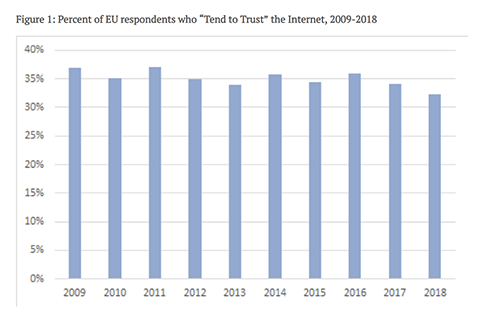Table of Contents
- Empowering consumers with full control over their information
- A new revenue channel for trading consumer information
- Providing marketers high-quality access to relevant and motivated audiences
- Reforming the personal data economy
Businesses gathering personal data play with fire and create unwanted liability associated with the responsibility. For most, it's not a choice but a business necessity to operate and deliver a service. New technologies are looking to provide businesses with a mechanism that alleviates the liability of holding personal data whilst creating a mutually beneficial data ecosystem for all parties.
Empowering consumers with full control over their information
Personal data privacy is a growing concern for most consumers. Online users are becoming increasingly aware of how big business is exploiting people with their own personal information. Monetization of data and targeted advertising are already touchpaper subjects. That’s just scratching the surface as shown by Netflix’s headlining documentary ‘The Great Hack’, which explores how personal data is used to manipulate democracy.
The show follows an investigation by David Caroll, an American professor, who is attempting to find out what Cambridge Analytica do with personal data. The controversial data mining company refused Carroll’s legal right to reclaim his personal data resulting in a failed lawsuit. He never received full disclosure of his personal information. Where they got the data, how it was processed, who it was shared with?
Consumers face a deluge of barriers in the current data ecosystem preventing them from taking back control. Individuals lose ownership of their information once it is handed to a vendor or other business. Data control and sovereignty is immediately relinquished and left open to the controller to prosper from or misuse the information.
Despite GDPR and a large number of heavy fines, individuals remain vulnerable to a lack of transparency in privacy policies. It’s often still difficult to decipher what organizations plan to do with personal data. Very few people have time to read privacy policies, which can be convoluted and unspecific. Even Google, who as a worldwide data harvester, failed to meet growing transparency legislation.

Photo by Markus Spiske on Unsplash
Online users are starting to realize the old saying ‘There is no such thing as a free lunch’, never has this been truer. Any online service which is free is highly likely to profit from exploiting identities by trading personal data or using it to fuel targeted advertising. Consider Google and Facebook, two of the most powerful organizations in the world, but their services are free of charge. In fact, the planet’s most valuable resource is no longer oil, it’s data. People have become a commodity.
Tide Protocol is building a solution to combat the exploitation of consumers and empower individuals, by providing an ecosystem that incentivizes businesses to embrace privacy. Consumers can start to trust vendors who these types of protocols. Using the open source technology, sensitive data is encrypted and locked in the company’s database. Customers are handed the only access key to that data set. With this key, the consumer retains effective control of how their data is then used or shared. Vendors may still be granted permission to use the information for normal operations. However, any dissemination to 3rd parties for research or marketing requires more explicit consumer consent and a share in its monetization.
A new revenue channel for trading consumer information
An endless list of problems exists in the current business of trading personal data. Their impacts are being increasingly felt by businesses operating in the trade.
Expanding privacy regulations designed to protect the consumer is leading to growing complexity in monetization. The market is being restricted as companies are inhibited from selling data using current revenue channels.
Breach risks cause major problems for all parties; consumers, vendors and data seekers. Companies controlling databases face damaging consequences from internal and external data breaches. Legal action is ever-present for even the slightest mistake or negligence. PR becomes a headache, very quickly resulting in a loss of brand value. For mid-level and smaller companies this could be fatal without the resources to survive the controversy.
In November 2018, already six months after the GDPR went into effect, 68% of EU survey respondents did not tend to trust the internet in relation to data protection. Consumer trust continues to decline despite so-called protective regulation. The growing mistrust penetrates all industries deep beyond social media websites. It is a problem for many businesses, as declining customer trust threatens to erode their relationship with customers.

How can we rebuild a new data economy fix these issues while creating new revenue channels?
An interesting way to do so is by creating a secure permission-based global data marketplace making personal data an asset rather than a liability. The current problems need addressing and present an opportunity for meaningful change. Consumers need increased control and transparency, while businesses need reliable data and the opportunity to profit from their own insights in a trustworthy ecosystem. Tide Protocol built upon distributed ledger technology aims to create a new data economy backbone. Blockchain coupled with encryption is used to enable data sovereignty and revenue generation in a secure global marketplace.
Vendors secure their database while consumers remain in control. With the consumer’s consent, vendors can then trade data and insights with marketers and researchers. Consumers are rewarded for granting access permissions while remaining in control, fostering new levels of trust and mutual gain. Vendors realize increasing value from data inventories with richer insights and new revenue opportunities.
“The natural phenomena of tides impact the lives and behavior of every organism on the planet. Its relative predictability has resulted in numerous symbiotic relationships between organisms of all shapes and sizes, despite their competing goals. Just so, a sustainable data economy can flourish, when the interests of all its stakeholders from large organizations down to individual consumers are designed into a reliable framework.” Michael Loewy, Tide Co-Founder
Providing marketers high-quality access to relevant and motivated audiences
Marketers and other data seekers rely on consumer data in order to build targeted, effective campaigns. Yet 56% of UK and US business executives attribute bad data to lost sales.
Consumers, who feel otherwise powerless, are increasingly falsifying data. This leads to subsiding results for marketers using the information. Returns on investment in digital marketing expenditure continue to drop. Trust is eroding for all parties with a lack of transparency around audience acquisition and composition. This is compounded by forced complicity in exploitative digital marketing practices undermining the ability to develop trusting relationships with audiences.
Tide enables marketers to join vendors and consumers in a mutually beneficial relationship. Marketers can use the marketplace as an efficient method to obtain powerful data. In addition, giving vendors a way to classify data, data seekers can then find and bid on rich target audiences resulting in smoother data transaction.
Once both parties agree, bid funds are locked using a smart contract. Consumers are incentivized to provide accurate data thanks to the renewed trust and get paid directly, alongside the businesses, without any human intervention.
Reforming the personal data economy
An interesting solution and an opportunity to reform the “Wild West” of the personal data economy is by offering businesses a mechanism that will not only alleviate the liability of holding personal data but:
- Empower each consumer with control over their information and transparency on its use.
- Improve data quality and introduce new revenue channels for the consensual trading of consumer information.
- Provide data seekers with previously unattainable insights and consenting, relevant and motivated audiences.
Tide’s commercial approach to addressing consumers’ right to data privacy introduces a sustainable model that can be built upon. The ultimate vision extends beyond an individual's sovereignty over their privacy - to their mindshare. Offering control and remuneration for not only people’s information but also their attention and intentions. Offering organizations the ability to not just profit from their audience insights, but to engage directly with that audience’s intentions, in the most contextual, consensual and timely fashion.
Investment Disclaimer







